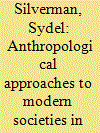|
|
|
Sort Order |
|
|
|
Items / Page
|
|
|
|
|
|
|
| Srl | Item |
| 1 |
ID:
109976


|
|
|
|
|
| Publication |
2011.
|
| Summary/Abstract |
At the time that Julian Steward was formulating the Puerto Rico Project, several other approaches to complex societies were being pursued by American anthropologists. Beginning in the 1920s, funders'-and subsequently, New Deal agencies'-interest in addressing social problems impelled microcosmic community studies in the United States. That approach, essentially functionalist and ahistorical, was extended to village studies in other countries, and Redfield's folk-urban continuum became the dominant theoretical framework for comprehending regions within nations. Concurrently, acculturation theory legitimized anthropological interests beyond "primitives" and offered an alternative, two-way cultural contact model. With the onset of World War II, the culture and personality approach was applied to strategic nations, providing holistic configurational depictions of national character. Steward's effort can be seen as a critique of, and alternative to, these approaches that were prevalent in the late 1940s. Building upon his method of cultural ecology, his orientation toward work, and his notions about sociocultural integration, he devised a different way of studying a total society. Steward's framework was modified and expanded by members of his team, both in the field and in the writing of the jointly authored book. While slow to have a wider impact, the project-both in its successes and its limitations-signaled new departures for the anthropological study of the modern world.
|
|
|
|
|
|
|
|
|
|
|
|
|
|
|
|
| 2 |
ID:
178790


|
|
|
|
|
| Summary/Abstract |
Taking the small number of ethnographic studies of Palestinian communities in North America as its problematic, this article situates that predicament in the larger context of decades of academic silencing of Arab American and SWANA (Southwest Asia and North Africa) studies, efforts that represent but one component of a larger political project to quash pro-Palestinian activism. Abetted by the absence of a racial category, scholars continue to face substantial hurdles at the institutional level, inhibiting the robust growth of the field and boding poorly for an expansion in community studies. Yet recent scholarship on Palestinians in North America—exemplified by the articles included in this special issue that center the complexities of identities; activism; and Black, Indigenous, and people of color (BIPOC) solidarities—evidences real changes on the ground for Palestinian activism. Those changes, and continued advocacy for institutional change, are necessary to invigorate community studies, a critically important method of scholar-activist praxis because of their power to enhance a community’s access to resources, well-being, organizing capacities, and local-level power and solidarity building.
|
|
|
|
|
|
|
|
|
|
|
|
|
|
|
|
|
|
|
|
|